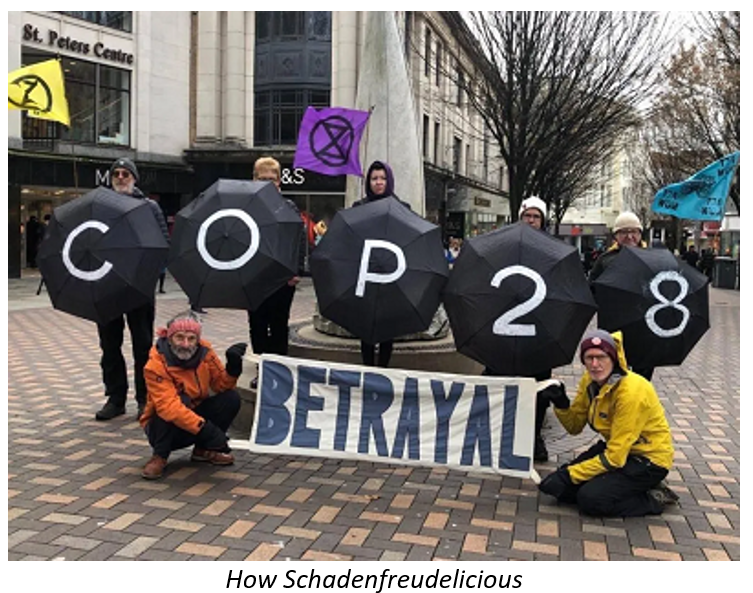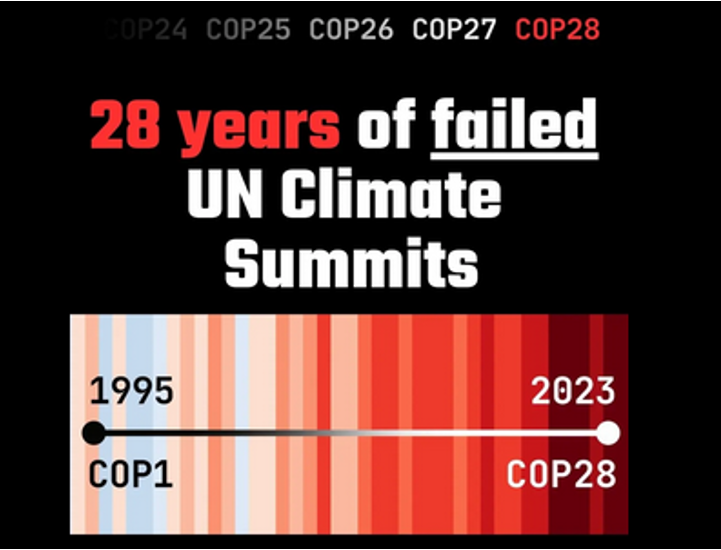LET’S PHASE OUT CLIMATE CHANGE INSTEAD
 At the COP28 climate summit in Dubai this December, the climate change world was waiting with bated breath for a final document that would declare war on fossil fuels.
At the COP28 climate summit in Dubai this December, the climate change world was waiting with bated breath for a final document that would declare war on fossil fuels.
The 70,000 delegates at the United Nations-sponsored event in the oil-rich nation of the United Arab Emirates hoped for a radical turning point where countries might agree to the “phase-out” of the production and consumption of oil, gas, and coal by mid-century.
For much of the conference, the debate was centered on whether to use the term “phase-out” or “phase-down” to describe the pace of the process to keep world temperature increase frozen at 1.5 degrees Celsius. Either term would put energy companies on notice that their days are numbered.
The climate-change movement has been waiting for this strong commitment since 1995. However, delegates were horrified to learn that the final draft document consisted of a watered-down agreement that did not mention fossil fuels and recommended actions that “could” be taken to reduce carbon footprints. There was no sense of urgency, drastic action plans, or concrete timelines.
Yep, it happened again:
The climate lobby was shocked and extended the deadline for the final document, working around the clock to hammer out something presentable. The final product was deemed a victory, although “phase-out” or “phase-down” were not mentioned. A softer term, “transition away,” to alternative fuel sources was inserted in this non-binding loophole-filled directive that satisfied no one.
Despite all the media fanfare declaring victory, climate-change scientists are calling the cop-out at COP28 “devastating and “dangerous.” One called it a “dream outcome” for the oil industry.” A Wall Street Journal editorial called it a “phony promise,” adding, “The point of the deal is to preserve the West’s illusion that its climate policies are accomplishing something.”
Prof. Michael Mann (of “Hide the Decline” infamy), a climatologist from the University of Pennsylvania, declared that “To ‘transition away from fossil fuels’ was weak tea at best. It’s like promising your doctor that you will ‘transition away from donuts’ after being diagnosed with diabetes.”
The lackluster policies seem to be standard fare for the COP meetings held almost yearly to realign worldwide commitments to climate-change goals. The meetings, a Conference of Parties (COP), revisit the themes discussed by the “parties” at the first COP meeting in Rio de Janeiro in 1992.
They usually feature many heads of state and government officials representing some 200 nations. Climate radicals complain that the meetings generally accomplish little — save to emit carbon from the tens of thousands that travel to attend.
In his recent Apostolic Exhortation Laudate Deum, Pope Francis bitterly complained of the failure of past conferences and held high hopes for the COP28 event, which sickness prevented him from attending. President Joe Biden, China’s Xi Jinping, and Russia’s Vladimir Putin were conspicuously absent, which many saw as a bad omen, demonstrating a lack of commitment.
The event was further shaken by an interview with COP28 president Sultan Al Jaber, who declared that “There is no science out there, or no scenario out there, that says that the phase-out of fossil fuel is what’s going to achieve 1.5C.” The statement, later walked back a bit, bordered on climate denial heresy. The sultan is also the chief executive of the United Arab Emirates’ state oil company, Adnoc.
Meanwhile, China and other developing countries remain committed to building more coal power plants. Oil production, including in the United States, is scheduled to go up, not down, over the coming years.
When even the event’s president is not entirely on board with the crisis narrative, it makes it hard to find its message believable. Something is seriously wrong with the climate crisis movement if it can only secure tiny incremental changes despite the immense resources and favorable media that all things ecological enjoy.
The movement is in crisis. It can’t get its messaging right. It fails even when followers gather exclusively to craft statements and action plans. Activists seem doomed to bounce from COP to COP without passing their agendas — emitting tons of carbon on their way to their far-flung destinations (see you next year in Azerbaijan).
Their hysterical message does not resonate or move people to action. It only seems to call for more carbon-heavy conferences and the distribution of lavish eco-subsidies to leftist NGOs.
Perhaps another kind of phase-out can be proposed. It is time to phase out the climate crisis.
The constant barrage of climate alarmism causes fatigue in public opinion. The dire predictions, “hockey stick” graphs, and “population bomb” datelines that fail to deliver an apocalypse rightly cause great skepticism.
Blaming every freak weather storm, natural disaster, or even sociopolitical crisis on climate change destroys the credibility of “the science” that should seek empirical evidence, not political agendas.
A phase-out or even a gradual phase-down of the eco-rhetoric and its accompanying climate summits would be a welcome relief for a public tired of being told inconvenient untruths.
John Horvat II is vice president of the American Society for the Defense of Tradition, Family and Property and the author of Return to Order.


